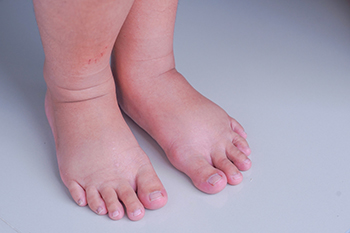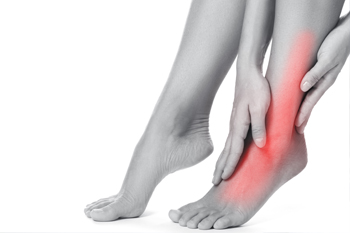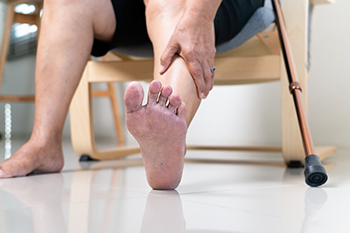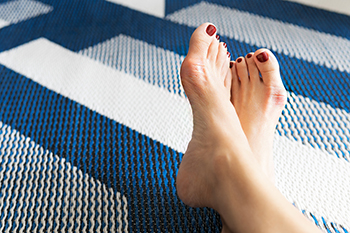Connect With Us
Blog
Items filtered by date: February 2024
Causes of Foot and Ankle Swelling

Foot and ankle swelling, medically known as peripheral edema, can be a distressing symptom with various underlying causes. One common reason for swelling is fluid retention, which can occur due to prolonged standing or sitting, especially in hot weather. Another culprit is injury or trauma to the foot or ankle, leading to inflammation and fluid accumulation in the affected area. Medical conditions such as venous insufficiency, deep vein thrombosis, or lymphatic obstruction can also result in swelling. Furthermore, heart failure, kidney disease, liver disease, and certain medications can contribute to fluid retention and subsequent swelling in the lower extremities. Hormonal changes during pregnancy or menstruation may cause temporary swelling. Lifestyle factors, like excessive salt intake, poor diet, obesity, and lack of physical activity, can cause swelling. Identifying the underlying cause of foot and ankle swelling is essential for effective management and prevention of complications. If your feet or ankles are swollen, it is suggested that you consult a podiatrist who can determine the cause and offer appropriate relief and treatment solutions.
Swollen feet can be a sign of an underlying condition. If you have any concerns, contact one of our podiatrists of Crosstown Podiatry. Our doctors can provide the care you need to keep you pain-free and on your feet.
Swollen feet are a common ailment among pregnant women and people who stand or sit for extended periods. Aging may increase the possibility of swollen feet and patients who are obese often notice when their feet are swelling too. There may be medical reasons why swollen feet occur:
- Phlebitis - A condition that causes the veins to become inflamed and can also cause leg pain.
- Liver disease - This may lead to low blood levels of albumin which is a protein. This can cause fluid in the blood to pass into the tissues and several areas of the body can become swollen.
- Heart failure - When the heart doesn’t pump properly the blood that is normally pumped back to the heart can pool in the veins of the legs causing swollen feet.
- Kidney disease - One of the main functions of the kidneys is releasing excess fluid in the body. This type of condition can make it difficult for the kidneys to function properly, and as a result the feet may become swollen.
- Deep-vein thrombosis (DVT)- This is a serious condition where blood clots form in the veins of the legs. They can block the return of blood from the legs to the heart which may cause the feet to swell. It is important to be treated by a podiatrist if this condition is present.
Swollen feet can also be caused by bone and tendon conditions, including fractures, arthritis, and tendinitis. Additionally, there may be skin and toenail conditions and an infection may cause the feet to swell. Patients who take medicine to treat high blood pressure may be prone to getting swollen feet.
Many patients elevate their feet to help relieve the swelling and this is generally a temporary remedy. When a podiatrist is consulted the reason behind the swelling can be uncovered and subsequently treated.
If you have any questions please feel free to contact our offices located in Wayne, Montclair, and Randolph, NJ . We offer the newest diagnostic tools and technology to treat your foot and ankle needs.
What Is Hereditary Multiple Exostoses?

Hereditary multiple exostoses, or HME, is a rare genetic condition causing benign cartilage tumors to form near bone growth areas. It is often inherited, more commonly from the father. While it mostly affects males and is usually diagnosed before the age of 10, females can also carry and pass on the condition. These tumors, known as osteochondromas, can develop in various bones, such as in the feet. They can lead to discomfort, especially if the tumors press against nerves or surrounding tissues. Additionally, as the tumors grow, they can cause mechanical pain, specifically if they interfere with joint movement or cause bone deformities. Treatment typically involves surgical removal when symptoms arise or if there is a risk of cancerous changes. If you have foot pain, it is suggested that you schedule an appointment with a podiatrist. Despite its rarity, HME can significantly affect individuals' daily lives, emphasizing the importance of early diagnosis and appropriate management.
Some foot conditions may require additional professional care. If you have any concerns, contact one of our podiatrists of Crosstown Podiatry. Our doctors can provide the care you need to keep you pain-free and on your feet.
Rare Foot Conditions
The majority of foot conditions are common and can be treated by a podiatrist. Standard diagnostic procedures are generally used to identify specific conditions and treatment can be rendered. A podiatrist also treats rare foot conditions which can be difficult to diagnose and may need extra attention and care.
There are many rare foot conditions that can affect children. Some of these can include:
- Freiberg’s disease
- Kohler’s disease
- Maffucci syndrome
Freiberg’s disease - This can be seen as a deterioration and flattening of a metatarsal bone that exists in the ball of the foot. It typically affects pre-teen and teenage girls, but can affect anyone at any age. Symptoms that can accompany this can be swelling, stiffness, and the patient may limp.
Kohler’s disease - This often targets the bone in the arch of the foot and affects younger boys. It can lead to an interruption of the blood supply which ultimately can lead to bone deterioration. The patient may limp or experience tenderness, swelling, and redness.
Maffucci syndrome - This affects the long bones in a child’s foot leading to the development of abnormal bone lesions. They are benign growths and typically develop in early childhood and the bones may be susceptible to breaking.
A podiatrist can properly diagnose and treat all types of rare foot conditions. If your child is affected by any of these symptoms or conditions, please don’t hesitate to call our office so the correct treatment method can begin.
If you have any questions please feel free to contact our offices located in Wayne, Montclair, and Randolph, NJ . We offer the newest diagnostic tools and technology to treat your foot and ankle needs.
Senior Foot Care

As we age, elderly foot care becomes increasingly important for maintaining mobility and preventing discomfort. It is beneficial for seniors to prioritize regular foot inspections that check for any signs of cuts, sores, or infections. Keeping the feet clean and dry helps prevent fungal infections and reduces the risk of complications. Moisturizing the feet regularly, especially the heels and soles, can prevent dryness and cracking. Choosing comfortable, well-fitted shoes with ample support and cushioning is essential to prevent foot pain and reduce the risk of falls. Seniors with diabetes should pay extra attention to foot care, inspecting for any signs of neuropathy or ulcers, and seeking prompt medical attention if necessary. Additionally, elevating the feet and performing gentle stretching exercises can help alleviate swelling and improve circulation. Finally, scheduling regular visits to a podiatrist for professional foot care and addressing any foot concerns promptly ensures optimal foot health and overall well-being for seniors. If you are elderly or providing care for a senior person, it is suggested that a podiatrist is included on the professional healthcare team.
Proper foot care is something many older adults forget to consider. If you have any concerns about your feet and ankles, contact one of our podiatrists from Crosstown Podiatry. Our doctors can provide the care you need to keep you pain-free and on your feet.
The Elderly and Their Feet
As we age we start to notice many changes in our body, but the elder population may not notice them right away. Medical conditions may prevent the elderly to take notice of their foot health right away. Poor vision is a lead contributor to not taking action for the elderly.
Common Conditions
- Neuropathy – can reduce feeling in the feet and can hide many life-threatening medical conditions.
- Reduced flexibility – prevents the ability of proper toenail trimming, and foot cleaning. If left untreated, it may lead to further medical issues.
- Foot sores – amongst the older population can be serious before they are discovered. Some of the problematic conditions they may face are:
- Gouging toenails affecting nearby toe
- Shoes that don’t fit properly
- Pressure sores
- Loss of circulation in legs & feet
- Edema & swelling of feet and ankles
Susceptible Infections
Diabetes and poor circulation can cause general loss of sensitivity over the years, turning a simple cut into a serious issue.
If you have any questions please feel free to contact our offices located in Wayne, Montclair, and Randolph, NJ . We offer the newest diagnostic and treatment technologies for all your foot and ankle needs.
Bunion Formation

Bunions are bony protrusions at the base of the big toe, and manifest gradually due to a combination of genetic predisposition and external factors. Inherited structural foot issues, such as flat feet or low arches, contribute to the vulnerability of developing bunions. The gradual shifting of the metatarsophalangeal joint creates misalignment, causing the big toe to lean towards the other toes. Wearing ill-fitting footwear, particularly shoes with narrow toe boxes, exacerbates this condition by squeezing the toes together. High heels further elevate the risk, tilting the body weight forward and putting added pressure on the joint. Over time, these repeated stresses lead to the development of bony growths. Additionally, inflammatory conditions such as arthritis can accelerate bunion formation. Many bunions are unsightly and uncomfortable. If you have developed a bunion, it is suggested that you consult a podiatrist who can determine what the best treatment method is for you, which may include surgery for permanent removal.
If you are suffering from bunions, contact one of our podiatrists of Crosstown Podiatry. Our doctors can provide the care you need to keep you pain-free and on your feet.
What Is a Bunion?
A bunion is formed of swollen tissue or an enlargement of boney growth, usually located at the base joint of the toe that connects to the foot. The swelling occurs due to the bones in the big toe shifting inward, which impacts the other toes of the foot. This causes the area around the base of the big toe to become inflamed and painful.
Why Do Bunions Form?
Genetics – Susceptibility to bunions are often hereditary
Stress on the feet – Poorly fitted and uncomfortable footwear that places stress on feet, such as heels, can worsen existing bunions
How Are Bunions Diagnosed?
Doctors often perform two tests – blood tests and x-rays – when trying to diagnose bunions, especially in the early stages of development. Blood tests help determine if the foot pain is being caused by something else, such as arthritis, while x-rays provide a clear picture of your bone structure to your doctor.
How Are Bunions Treated?
- Refrain from wearing heels or similar shoes that cause discomfort
- Select wider shoes that can provide more comfort and reduce pain
- Anti-inflammatory and pain management drugs
- Orthotics or foot inserts
- Surgery
If you have any questions, please feel free to contact our offices located in Wayne, Montclair, and Randolph, NJ . We offer the newest diagnostic and treatment technologies for all your foot care needs.

